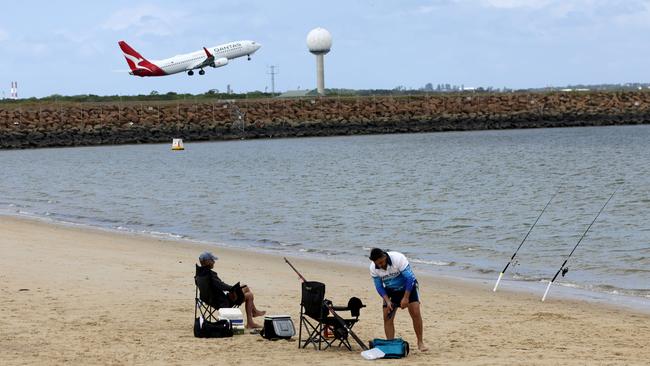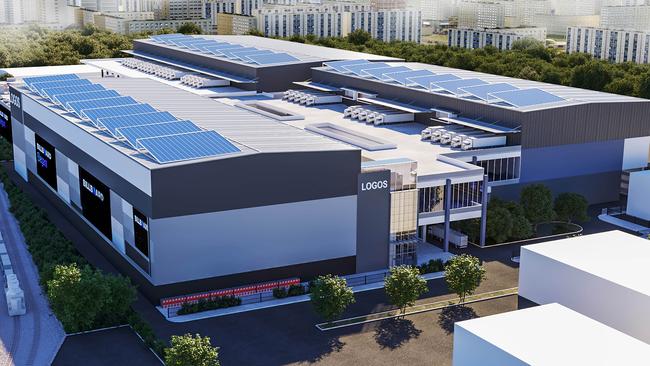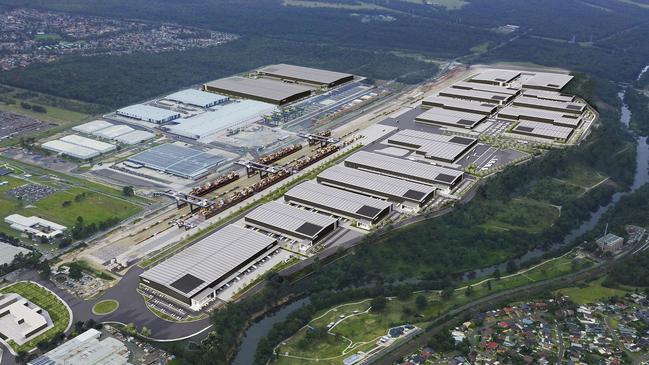Logos realises its Asian dreams as Sydney projects take flight
A move by funds manager Logos to purchase a major land parcel next to Sydney Airport for $802m brought the industrial property boom into sharp perspective.

Barely a week goes by without a record price being paid for an industrial property, but a move by funds manager Logos to purchase a major land parcel next to Sydney Airport for $802m brought the boom into sharp perspective.
The long-held parcel was sold this month by Qantas and, despite the premium it attracted, the buyer is confident it will be able to successfully develop a $2bn-plus logistics hub at the airport, with the backing of partners AustralianSuper and Middle Eastern fund ADIA.
The facility opposite Kingsford Smith Airport will become part of the landscape for millions of travellers, but Logos has emerged as the quiet success story of Australian property as it has ridden the logistics boom to expand locally and around the region.
Founded in Sydney just over a decade ago by veteran executives Trent Iliffe and John Marsh, the company has grown into an essential player for companies looking to shift goods in Australia and offshore.
Now majority-controlled by the Singapore-based ARA platform, Logos is set to grow even further as its operations are pulled together with Asian logistics giant ESR as part of that Hong Kong group’s $US5.2bn takeover of ARA.
The combination could result in the pair surpassing traditional giant Goodman in coming years, even on Goodman’s home turf.
Iliffe is respectful of the sector giant and says that the company would not catch it on its own, but once the merger is complete in several years the pairing “should be bigger than Goodman”.

The Logos story begins in 2010 in the shadow of the global financial crisis, when industrial property and development were both tough sells.
Fast forward a decade and the coronavirus pandemic has made all the difference to proving up the worth of logistics property. “Covid really set everybody straight on what the asset class is,” Iliffe says. “We’re an essential service asset class.”
And the big pension funds that have backed its expansion noticed.
“If you look through global investment appetite and allocations to logistics, there’s a considerable reweighting of portfolios to logistics,” Iliffe says.
The other big driver has been the Asian growth story. “We have about 1.8 billion new middle-income earners coming into Asia in the next 10 to 15 years and we’ve got to build infrastructure to support that growth. That’s a big task,” he says. But Iliffe recalls that as a start-up it was difficult to get backing. However, the group broke through, advising Singaporean sovereign wealth fund GIC on its move into industrial property in Australia and then private equity group Blackstone in 2012 as it forged into China.
Both investors sold out as the cycle picked up in the middle of the last decade, leaving Logos to then team with Macquarie Capital as it began an inexorable rise, with the Australian bank exiting last year as ARA came on board.
Logos not only became one of the most active property buyers and developers in Australasia, but forged deep into China, Singapore, India, Japan, South Korea, Indonesia, Malaysia and Vietnam with the backing of global pension funds.
But the airport deal will become its public face, with Qantas chief executive Alan Joyce indicating the airline would work with Logos on creating a Qantas precinct as part of its $2bn-plus redevelopment plans. It could see a new headquarters combined with a relocated training centre and distribution hub, right next to the airport. Logos is also in talks to secure an adjoining 3ha of land.
The developments will give the Logos business a Sydney flavour as it will have about $8bn worth of projects on the go in the city. In July, it struck a deal with Qube to acquire the nation’s largest intermodal facility at Moorebank, in southwestern Sydney, for about $1.67bn. That project is already taking shape.
For Iliffe, the challenge is bringing the best of its international operations – many Asian cities boast deeper penetration of e-commerce than locally – and bringing it back home.
“Australia is still a really attractive investment market, and we’ll have about $15bn of funds under management here alone,” he says of the group’s size when its developments are completed.

He sees major structural changes in the way individual customers and big companies are behaving and predicts further shake-ups to come for whole industries.
Iliffe just toured a facility in South Korea run by a company that has revolutionised supermarket shopping in that country, and says that such challengers will find there way here as preferences change.
He argues that traditional loyalties may fall away and customers will back whoever provides the best service. “It’ll be who can deliver using the best, easiest and simplest process to my front door,” he says.
Australia will be a big focus, and Logos has raised about $4.2bn in equity for local funds. But Iliffe insists the focus has not wavered from high-quality logistics even as market pricing has jumped.
“We haven’t chosen funds under management, we have not compromised,” he said.
That doesn’t mean Logos is standing still. If anything, the next phase of its life could get more exciting with initiatives ranging from a green data centre fund to works on facilities so they are environmentally sustainable.
Logos sees opportunities for data centres at its properties around Asia and in Australia as cloud computing companies seek space, and it has already built in Jakarta. The aim is to also provide fully renewable energy solutions for the facilities by 2030.
Logos is also raising a renewable energy infrastructure fund and has a partnership with French company Engie to provide solar generation and renewable energy options across its portfolio.
Iliffe says that developers building much-needed cold-storage facilities and hi-tech automated warehouses will also be required to have renewable-energy solutions. The shift is already on to building carbon-neutral projects. “Investors will say, ‘I will not invest unless its carbon-neutral’, and their customers will start to say, ‘I won’t occupy the building unless its carbon-neutral’, he says.
For now, industrial developers are benefiting from the wave of catch-up. “We’ve gone through a period where we had just-in-time supply chains,” he says, noting that that model is now considered too risky.
“Customers are saying ‘we need to store more products in warehouses’, so that if there’s another Covid or another shutdown they can still keep supplying the manufacturing process,” Iliffe says.
“E-commerce has jumped ahead of where it would have been without a Covid pandemic, so the world is desperately trying to catch up on rolling out space.”
The global tensions that have emerged are also driving demand. Instead of just relying on China, companies are also looking to Southeast Asia.
Australia is also benefiting and markets such as Mascot are already seeing rent jumps in addition to yield compression on properties. “We’re actually achieving in some situations better than underwriting on rents in the space of 12 months just because of the amount of people taking warehousing space,” Iliffe says.
Despite Chinese residential developer Evergrande rattling that sector of the market, Iliffe remains bullish about logistics in that country. “China for us is about domestic consumption,” he says. This is not slowing and remains a key plank of the Logos platform that is approaching $US20bn ($26.6bn) overall.
Looking ahead, Logos is now set to grow in line with the rapacious expansion of its logistics customers that ferry goods around globe. This focus has been its point of difference and is perhaps unique to logistics property.
“It has never been building for the sake of building real estate; we’re building to support the demands of Amazon, DHL, Unilever and Alibaba,” Iliffe says.
“We want to make sure wherever they need us to be, we’re there to support their growth.”








To join the conversation, please log in. Don't have an account? Register
Join the conversation, you are commenting as Logout